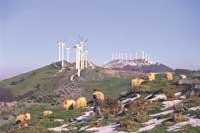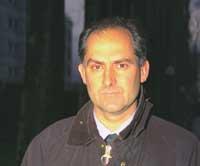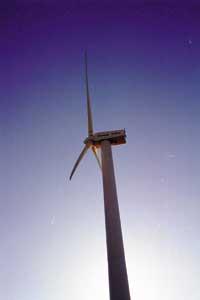Wind energy

“The development of renewable energy is essential
In short, what are the main axes of the wind energy plan of the Autonomous Community of the Basque Country?
The plan is still in progress. It is based on the Basque Country Regulation and the Basque Country Energy Strategy 2005-3E 2005. The plan foresees the installation of 175 megawatts of wind energy by 2005. The objective would be to choose the location of wind farms, taking into account their possible impact on the environment.
What steps should be taken to build a wind farm?
These include the authorization of land owners, the Environmental Impact Declaration, the approval of the Special Plan or Sectoral Territorial Plan, the Administrative Authorization of the Installation (wind turbines, substation, electric line, etc. ), Execution Authorization, Action License, Authorization of Etc. In short, all these procedures guarantee full respect for the environment in the construction of the wind farm and compliance with the regulations on protected spaces, protection of flora and fauna, mountains, protection of historical heritage, noise pollution, etc.

Many procedures. Are projects delayed as a result?
This is a new initiative in the Autonomous Community, so all institutions, just in case, comply with all the measures for projects to be developed in the best conditions. When the first is done, we might think that the processing of descendants will be easier. Numerous entities and departments of each entity participate in the processing. That is why the paper count is lengthened.
What is taken into account for the park location?
First, that the wind itself is sufficient and suitable for energy use. In addition, the site must meet the environmental and urban conditions necessary for the location of the wind farm. The Environmental Impact Study is used to determine compliance with these requirements.
Do you talk to municipalities before deciding?
Of course. Any work to be done, such as installing a wind measuring tower, requires municipal authorization. Therefore, from the beginning the relationship with municipalities is constant.
What are the best aspects of the energy obtained through the wind?
Related to the environment. They are also socio-economic (job creation…), energy (self-supply…) and economic (income for municipalities and councils…).
And its negative aspects?
The only negative is the change that affects the landscape. According to the Navarre experience, other possible damages, such as noise or bird disease, do not exist. In addition, according to surveys conducted among the population, many say that wind farms have no negative effects on the landscape, and that if the benefits that come from wind energy equate the situation.
After the drafting of the Wind Energy Plan of the Autonomous Community of the Basque Country, it was sent to various institutions and associations for correction and suggestions. What will happen to the proposals that come out of there?
I hope that the existing proposals will be analyzed and that changes can be introduced.
Why the step in favor of wind energy?
Not only would he talk about wind energy, but about renewable energy. The development of this type of energy is fundamental to the fulfillment of the environmental commitments acquired in the European Union, especially the reduction of CO2. Thermal power plants that use fossil fuels such as coal or oil are the main causes of the greenhouse effect. Against this, in addition to saving energy, it is necessary to replace polluting energies with clean energies such as renewables.
Europe has set a target for renewable energy to be 6% to 12% by 2010.

In addition to the wind turbines observed on the mountain peaks, there are other systems to take advantage of the wind force, with less investment and less landscape impact. Why don't these systems be driven?
Wind turbines are of two types: those of vertical axis, mostly of three arms, and those of horizontal axis. The first in the world have developed more in all areas, but that does not mean that in the future nothing alternative to the three current arms will develop. The Basque Country has the collaboration of the Basque Government, Enerlim, which is developing a new wind turbine system. This company has also received a grant for the development phase and the implementation of the project. In addition, there is another type of project, that of transport of energy to isolated places and that on our part receives subsidy.
If wind power is so beneficial, why not use it entirely?
Well, wind power hasn't developed properly until recently. Between 1996 and 1997 the wind power installed in the world has gone from 6,000 MW to 7,250 MW, with the aim of installing 40,000 MW in Europe by 2010.
Questions related to press reviews. You said all environmental groups agreed to the 2005 Energy Plan. Eguzki missed this. To say something?
I do not think I have said so, nor of the wind energy plan of the Autonomous Community of the Basque Country, which is not yet being processed.
Eguzki established three conditions to support the plan: 1) Be really alternative. 2) Have public energy. 3) Decentralization.
As for the first condition, wind is always an alternative, as renewable energy always guarantees access to the network. This does not happen with the electricity generated from thermal power plants, as they will create what is necessary to complete what comes from renewables according to demand. Therefore, it is clear that what comes out in wind farms will not come out in thermal power plants, so wind is an alternative.
For advertising reasons, the Wind Company of Euskadi is a company with 50% public money, if you add to it the taxes generated (VAT, companies, economic activities…), it can be assumed that more than 75% of the profits go to public money.

Decentralization... well, renewable energies are themselves decentralized. By law they are in a Special Regulation, outside the laws of thermal and nuclear power plants. For example, the Santurtzi thermal power plant has 900 MW and the Elgea project with 24 MW, almost 40 times less. If we talk about energy production, we should say that the park is 100 times smaller, since only something comes out when there is wind.
As a result, I believe that we are achieving a significant decentralization while facing electrical losses, bringing the place of power generation and consumption. That's the most important thing, to start saving what we have before we start replacing the energies.
If wind farms are expanded and the rest of energy sources are not closed, will CO2 emissions be reduced?
The access of wind energy to the power grid is guaranteed, unlike that of thermal power plants. Depending on the existing demand, the latter should act as a complement. Therefore, what is done in wind farms will not be done in thermal power plants, so less CO2 will be generated depending on what is done.
Another thing would be where less gas is produced. Only 20% of the energy used in the Autonomous Community of the Basque Country is obtained in it, and the energy produced in local wind farms will not be produced in external thermal plants (Asturias, Teruel…), where the emission of polluting gases will be reduced. The environment is not a problem of a country or region, but of the whole planet; each of us, as far as possible, should contribute. If we wouldn't think like that, we would bring out all the energy we need, but that's not fair.
Buletina
Bidali zure helbide elektronikoa eta jaso asteroko buletina zure sarrera-ontzian











